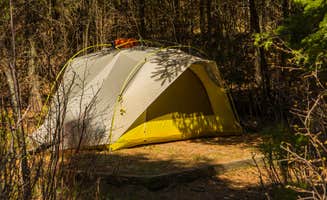Tent campsites near Birchdale, Minnesota generally require water transportation to access, particularly for reaching the island sites in Voyageurs National Park. The park encompasses over 218,000 acres with more than 500 islands and 655 miles of undeveloped shoreline. Winter temperatures can drop to -45°F, while summer days typically range between 66-80°F with periodic thunderstorms.
What to do
Paddle your own path: Visitors with inflatable kayaks can access island campsites like site #R67 on Rainy Lake. One camper noted, "It wasn't too tough to get out there in our inflatable kayak from the mainland (maybe an hour or so?) and we were able to navigate the islands just fine." Rainy Lake Frontcountry Camping offers sites with both sunset and sunrise views.
Visit before summer season: Traveling in early spring can provide a more solitary experience. According to a camper at Namakan Lake, "We stayed here 2 nights in early May and saw 3 boats the entire time." Wildlife activity increases during these quieter periods, making it ideal for nature observation. Namakan Lake Frontcountry Camping provides protected boat landing areas even during shoulder seasons.
Navigate with proper tools: Water navigation requires preparation. The countless islands and channels can confuse even experienced boaters. As one visitor advised, "Get a detailed chart before attempting to navigate the lake, as the twists and turns and hundreds of islands can be quite confusing without one." Many campsites are unmarked from the water, requiring GPS coordinates or detailed maps.
What campers like
Protected boat docking: Sites with sheltered landing zones add convenience. At Namakan Lake Frontcountry Camping, a visitor highlighted that the "Kayak/canoe landing area is protected from the main channel/wind, can accommodate multiple boats with ease, and is just a short 'schlep' up the stairs to the campsite." These protected areas reduce weather concerns when camping with watercraft.
Private island experiences: The isolation of having an entire island to yourself creates unique camping opportunities. At Rainy Lake Frontcountry Camping, campers appreciate that "since we were on our own small island, it felt truly special." Private islands typically offer 360-degree water views and complete solitude.
Wildlife soundscapes: Nighttime brings distinctive natural sounds in this region. Campers often report hearing distinctive loon calls throughout the night. One camper at Namakan Lake observed they "fell asleep to loons and owls calling in the night," providing natural ambiance unavailable at more developed campgrounds.
What you should know
Reservation requirements: During peak summer months, frontcountry sites fill quickly. Experienced campers strongly recommend advance planning: "We did not have reservations ahead of time, but we'd highly recommend it during the summer season, because we were told they usually fill up." Off-season visits provide more flexibility with walk-up permits often available.
Variable site amenities: Facilities differ significantly between campgrounds. At Arnold's Campground, recent visitors reported concerns about cleanliness: "The bathrooms were dingy and ill stocked, the showers were so moldy and stinky and clearly hadn't been cleaned in ages." Frontcountry sites in Voyageurs often include bear boxes but require campers to bring their own toilet paper.
Tent-specific considerations: Not all campgrounds accommodate tent camping well. One visitor to Arnold's Campground warned, "Despite advertising sites as 'tent site' this campground, it is definitely not suitable for tents. We booked a tent site that was in a block of other tent sites. When we arrived, we saw a HUGE RV in the site next to ours that took up our space."
Tips for camping with families
Mainland alternatives: For families concerned about water access, Faunce Campground in Beltrami Island State Forest offers drive-in accessibility year-round. This option eliminates water transportation logistics while providing picnic tables, toilets, and trash disposal facilities important for family camping.
Weather preparation: Temperature fluctuations require versatile gear. Summer nights can drop below 50°F even after warm days. Rain protection is essential as summer storms develop quickly over the lakes. Families should pack clothing for multiple weather scenarios during the same trip.
Water safety protocols: Life jackets are mandatory for all children in boats regardless of swimming ability. Shallow landing areas can have submerged obstacles. Careful site selection should prioritize protected swimming areas away from boat channels for families with younger children.
Tips from RVers
RV site selection: Many campgrounds advertise RV compatibility but have limitations. At Arnold's Campground, a camper noted: "The campsite was clean and hook ups worked great!" However, site spacing can be tight with "campsites close together and no privacy." RVers should request specific information about site dimensions before booking.
Water access considerations: RV campers wanting to explore Voyageurs National Park should research boat rental options in advance. Most rental services require reservations during peak season. Some RV parks offer shuttle services to boat launches or maintain their own launch facilities for guests.
Winter access limits: RV camping options decrease significantly during winter months. Snow accumulation affects road accessibility to more remote campgrounds. Winter RV camping requires self-sufficiency with water tanks and waste management as most water systems shut down to prevent freezing.


